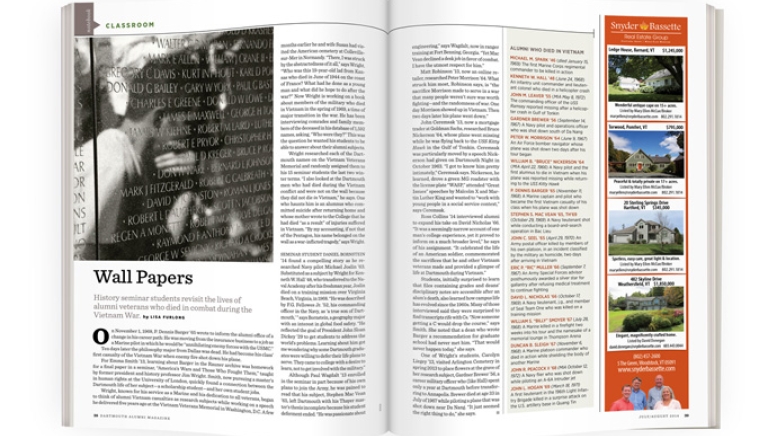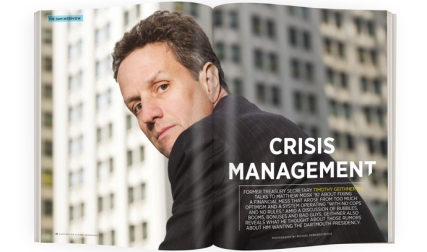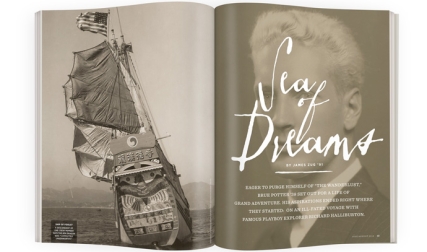On November 1, 1968, P. Dennis Barger ’65 wrote to inform the alumni office of a change in his career path: He was moving from the insurance business to a job as a Marine pilot in which he would be “annihilating enemy forces with the USMC.”
Ten days later the philosophy major from Dallas was dead. He had become his class’ first casualty of the Vietnam War when enemy fire shot down his plane.
For Emma Smith ’13, learning about Barger in the Rauner archive was homework for a final paper in a seminar, “America’s Wars and Those Who Fought Them,” taught by former president and history professor Jim Wright. Smith, now pursuing a master’s in human rights at the University of London, quickly found a connection between the Dartmouth life of her subject—a scholarship student—and her own student jobs.
Wright, known for his service as a Marine and his dedication to all veterans, began to think of alumni Vietnam casualties as research subjects while working on a speech he delivered five years ago at the Vietnam Veterans Memorial in Washington, D.C. A few months earlier he and wife Susan had visited the American cemetery at Colleville-sur-Mer in Normandy. “There, I was struck by the abstractedness of it all,” says Wright. “Who was this 19-year-old lad from Kansas who died in June of 1944 on the coast of France? What had he done as a young man and what did he hope to do after the war?” Now Wright is working on a book about members of the military who died in Vietnam in the spring of 1969, a time of major transition in the war. He has been interviewing comrades and family members of the deceased in his database of 1,592 names, asking, “Who were they?” This was the question he wanted his students to be able to answer about their alumni subjects.
Wright researched each of the Dartmouth names on the Vietnam Veterans Memorial and randomly assigned them to his 15 seminar students the last two winter terms. “I also looked at the Dartmouth men who had died during the Vietnam conflict and were not on the wall because they did not die in Vietnam,” he says. One who haunts him is an alumnus who committed suicide after returning home and whose mother wrote to the College that he had died “as a result” of injuries suffered in Vietnam. “By my accounting, if not that of the Pentagon, his name belonged on the wall as a war-inflicted tragedy,” says Wright.
Seminar student Daniel Bornstein ’14 found a compelling story as he researched Navy pilot Michael Joslin ’63. Substituted as a subject by Wright for Kenneth W. Hall ’48, who transferred to the Naval Academy after his freshman year, Joslin died on a training mission over Virginia Beach, Virginia, in 1968. “He was described by F.G. Fellowes Jr. ’52, his commanding officer in the Navy, as ‘a true son of Dartmouth,’ ” says Bornstein, a geography major with an interest in global food safety. “He reflected the goal of President John Sloan Dickey ’29 to get students to address the world’s problems. Learning about him got me wondering why some Dartmouth graduates were willing to defer their life plans to serve. They came to college with a desire to learn, not to get involved with the military.”
Although Paul Wagdalt ’13 enrolled in the seminar in part because of his own plans to join the Army, he was pained to read that his subject, Stephen Mac Vean ’65, left Dartmouth with his Thayer master’s thesis incomplete because his student deferment ended. “He was passionate about engineering,” says Wagdalt, now in ranger training at Fort Benning, Georgia. “Yet Mac Vean declined a desk job in favor of combat. I have the utmost respect for him.”
Matt Robinson ’13, now an online retailer, researched Peter Morrison ’64. What struck him most, Robinson says, is “the sacrifice Morrison made to serve in a war that many people weren’t sure was worth fighting—and the randomness of war. One day Morrison showed up in Vietnam. Then two days later his plane went down.”
John Ceremsak ’13, now a mortgage trader at Goldman Sachs, researched Bruce Nickerson ’64, whose plane went missing while he was flying back to the USS Kitty Hawk in the Gulf of Tonkin. Ceremsak was particularly moved by a speech Nickerson had given on Dartmouth Night in October 1963. “I got to know him pretty intimately,” Ceremsak says. Nickerson, he learned, drove a green MG roadster with the license plate “WASP,” attended “Great Issues” speeches by Malcolm X and Martin Luther King and wanted to “work with young people in a social service context,” says Ceremsak.
Ross Collins ’14 interviewed alumni to expand his take on David Nicholas ’66. “It was a seemingly narrow account of one man’s college experience, yet it proved to inform on a much broader level,” he says of his assignment. “It celebrated the life of an American soldier, commemorated the sacrifices that he and other Vietnam veterans made and provided a glimpse of life at Dartmouth during Vietnam.”
Students, initially surprised to learn that files containing grades and deans’ disciplinary notes are accessible after an alum’s death, also learned how campus life has evolved since the 1960s. Many of those interviewed said they were surprised to find transcripts rife with Cs. “Now someone getting a C would drop the course,” says Smith. She noted that a dean who wrote Barger a recommendation for graduate school had never met him. “That would never happen today,” she says.
One of Wright’s students, Carolyn Liegey ’13, visited Arlington Cemetery in spring 2013 to place flowers at the grave of her research subject, Gardner Brewer ’56, a career military officer who (like Hall) spent only a year at Dartmouth before transferring to Annapolis. Brewer died at age 33 in July of 1967 while piloting a plane that was shot down near Da Nang. “It just seemed the right thing to do,” she says.
Alumni Who Died in Vietnam
Michael M. Spark ’46 (died January 15, 1969) The first Marine Corps regimental commander to be killed in action
Kenneth W. Hall ’48 (June 24, 1968) An infantry unit commander and lieutenant colonel who died in a helicopter crash
John M. Leaver ’55 (MIA May 8, 1972) The commanding officer of the USS Ramsey reported missing after a helicopter crash in Gulf of Tonkin
Gardner Brewer ’56 (September 14, 1967) A Navy pilot and operations officer who was shot down south of Da Nang
Peter W. Morrison ’64 (June 9, 1967) An Air Force bomber navigator whose plane was shot down two days after his tour began
William B. “Bruce” Nickerson ’64 (MIA April 22, 1966) A Navy pilot and the first alumnus to die in Vietnam when his plane was reported missing while returning to the USS Kitty Hawk
P. Dennis Barger ’65 (November 11, 1968) A Marine captain and pilot who became the first Vietnam casualty of his class when his plane was shot down
Stephen S. Mac Vean ’65, Th’69 (October 29, 1969) A Navy lieutenant shot while conducting a board-and-search operation in Bac Lieu
John C. Seel ’65 (April 29, 1970) An Army postal officer killed by members of his own platoon, in an incident classified by the military as homicide, two days after arriving in Vietnam
Eric P. “Ric” Muller ’66 (September 7, 1967) An Army Special Forces advisor posthumously awarded a silver star for gallantry after refusing medical treatment to continue fighting
David L. Nicholas ’66 (October 17, 1969) A Navy lieutenant, j.g., and member of Seal Team One who was killed on a training mission
William S. “Billy” Smoyer ’67 (July 28, 1968) A Marine killed in a firefight two weeks into his tour and the namesake of a memorial lounge in Thompson Arena
Duncan B. Sleigh ’67 (November 6, 1968) A Marine platoon commander who died in action while shielding the body of another Marine
John R. Peacock II ’68 (MIA October 12, 1972) A Navy flier who was shot down while piloting an A-6A Intruder jet
John L. Hogan ’69 (March 18, 1971) A first lieutenant in the 196th Light Infantry Brigade killed in a surprise attack on the U.S. artillery base in Quang Tin




